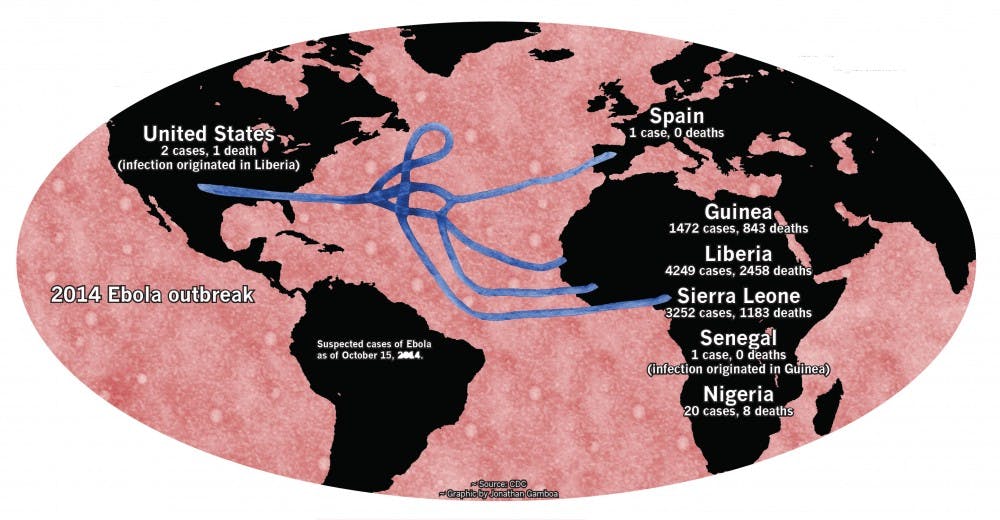A UNM scientist is attempting to modify experimental Ebola vaccines to make them more effective.
Dr. Steven Bradfute, research assistant professor in the UNM Department of Internal Medicine and Center for Global Health, is working in collaboration with other scientists on vaccine development for the Ebola virus, Marburg virus (Ebola’s closest relative) and a group of other hemorrhagic fever viruses classified as New World Arenaviruses.
“We take existing experimental vaccines and try to improve them,” Bradfute said. “There are several Ebola vaccines that are effective in monkey studies.”
Bradfute and his colleagues are testing those vaccines in mice to determine their effectiveness, because mice have similar immune systems to humans, he said.
“We can do this by testing blood from vaccinated animals to measure their immune response,” he said. “From that point we can move to other animals and, if successful, hopefully eventual human trials. But right now my work is at the early stage of vaccine development.”
Bradfute said he began researching Ebola and related viruses in 2005 at the U.S. Army Medical Research Institute of Infectious Diseases.
“Ebola is a type of hemorrhagic fever virus that can cause internal and external bleeding, multiple organ failure and symptoms similar to shock,” he said. “There are actually five types of Ebola, four of which are dangerous in humans. The current outbreak is the Zaire ebolavirus, which was first discovered in 1976.”
Ebolaviruses are effective in blocking early antiviral immune responses, which leads to rapid viral replication and hyperinflammation, which together can cause the symptoms listed above, he said.
“The lethality rate for Ebola can range from about 25 to 90 percent, depending on the type of Ebola and the health care conditions where the outbreak occurs,” he said.
Two cases of Ebola have recently been reported in the United States, after the virus infected thousands of people in Africa, CNN reported. U.S. health officials said a Dallas health worker who looked after the first Ebola victim to die in the United States contracted the disease despite wearing a full protective gown, gloves and face shield as she cared for him.
The Centers for Disease Control and Prevention have also sent experts to Texas to trace anyone who may have come in contact with the Liberian who traveled to Dallas while he was contagious, the official website of the organization said.
However, Bradfute said this not the first time that dangerous viruses have been imported to the U.S.
Get content from The Daily Lobo delivered to your inbox
“A few years ago, a patient contracted an infection with Marburg virus — Ebola’s equally lethal cousin — in Uganda and returned to Colorado,” he said. “The patient developed the disease in Colorado and survived. It was not known until months later that the patient had Marburg virus infection.”
He added that these viruses are not as contagious as the flu or common cold.
“Having said that, it is important to exercise caution and take the imported Ebola virus cases very seriously,” he said. “If we are cautious, there shouldn’t be a widespread epidemic, as past history has shown us how to control spread of the virus.”
On its part, the international community has also stepped up its anti-Ebola fight, with the U.N. Mission for Ebola Emergency Response (UNMEER) launching a strategy to rein in the disease.
The recent spread of Ebola started in West Africa, where World Health Organization officials report the virus has killed thousands of people.
“The latest case-count in the Ebola outbreak is 8,914, with a death toll of 4,447,” WHO officials said in a press release.
The death rate in the Ebola epidemic raging in West Africa has reached around 70 percent, according to Bruce Aylward, assistant director-general of the World Health Organization.
He said that the number of cases is continuing to spiral in the three hardest-hit countries: Liberia, Sierra Leone and Guinea.
“The reason the outbreak is so troubling in Liberia, Sierra Leone and Guinea is that there is not sufficient health care or infrastructure to isolate patients and monitor the health of their contacts in the populated areas where the outbreak is happening,” Bradfute said.
There are a few Ebola vaccines that are now in early human trials. These trials are conducted in humans that are not in contact with the virus in order to see how safe the vaccines are and how strong the immune responses they generate are, he said.
“There has been some talk of using some of these vaccines in humans that are at high risk of contracting Ebola, such as health care workers near the outbreaks in Africa. But it is too early to tell if this will occur,” Bradfute said.
Bradfute’s research has been funded primarily by the Department of Defense and UNM Health Sciences Center School of Medicine, as well as the Center for Global Health in the Department of Internal Medicine.
Sayyed Shah is the assistant news editor at the Daily Lobo. He can be contacted at assistant.news@dailylobo.com or on Twitter @mianfawadshah.






